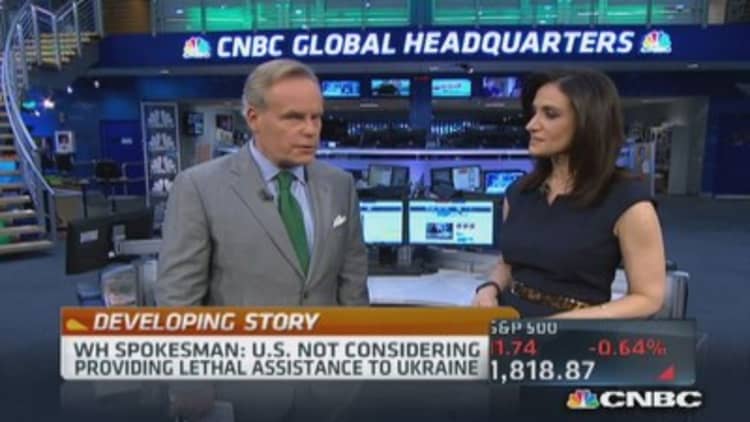Treasurys
U.S. Treasurys extended earlier losses on Thursday after foreign ministers in Geneva said they agreed on initial 'concrete steps' to de-escalate tensions in Ukraine.
"We worked hard and we worked in good faith in order to try and narrow our real differences, some of them significant," U.S. Secretary of State John Kerry said in a news conference after the agreement was reached.
Benchmark 10-year notes were last down 22/32 in price to yield 2.71 percent, up from 2.64 percent late on Wednesday, while the 30-year bond dropped 1 4/32 in price to yield 3.51 percent, a session high.
The yields have risen from one-and-a-half-month lows of 2.60 percent on Tuesday, when concerns about escalating tension in Ukraine sparked safety buying and a weak New York manufacturing survey raised fears over the strength of the U.S. recovery.
Prior to the announcement, the Philadelphia Federal Reserve Bank said its business activity index rose to 16.6 from 9.0 in March, topping economists' expectations for 10.0, according to a Reuters poll.

In a separate report, the Labor Department said initial jobless claims for state unemployment benefits ticked up 2,000 to a seasonally adjusted 304,000 for the week ended April 12.
They stayed close to a 6-1/2 year low touched the prior week. Selling came after intermediate-dated debt weakened on Wednesday after Federal Reserve Chair Janet Yellen took an optimistic tone on the economy, but stressed any decision to raise interest rates would hinge on healing in the labor market and how briskly inflation rose toward the Fed's 2 percent goal.
"There is follow-through from yesterday, there was significant selling in the middle of the curve," said Tom Tucci, head of Treasuries trading at CIBC in New York. Low liquidity before the early close is likely adding to the price pressure, he added.
The bond market will close at 2 p.m. EDT on Thursday and be closed all day on Friday for the Good Friday holiday.
Yellen said on Wednesday that persistently low inflation poses a more immediate threat to the U.S. economy than rising prices, stressing that the U.S. central bank would be delivering policy stimulus for some time to come.
Data on Tuesday showed that U.S. consumer prices firmed a bit in March, as food and housing rental costs rose in a possible sign that a disinflationary trend had run its course.
—By Reuters. CNBC contributed to this report.

